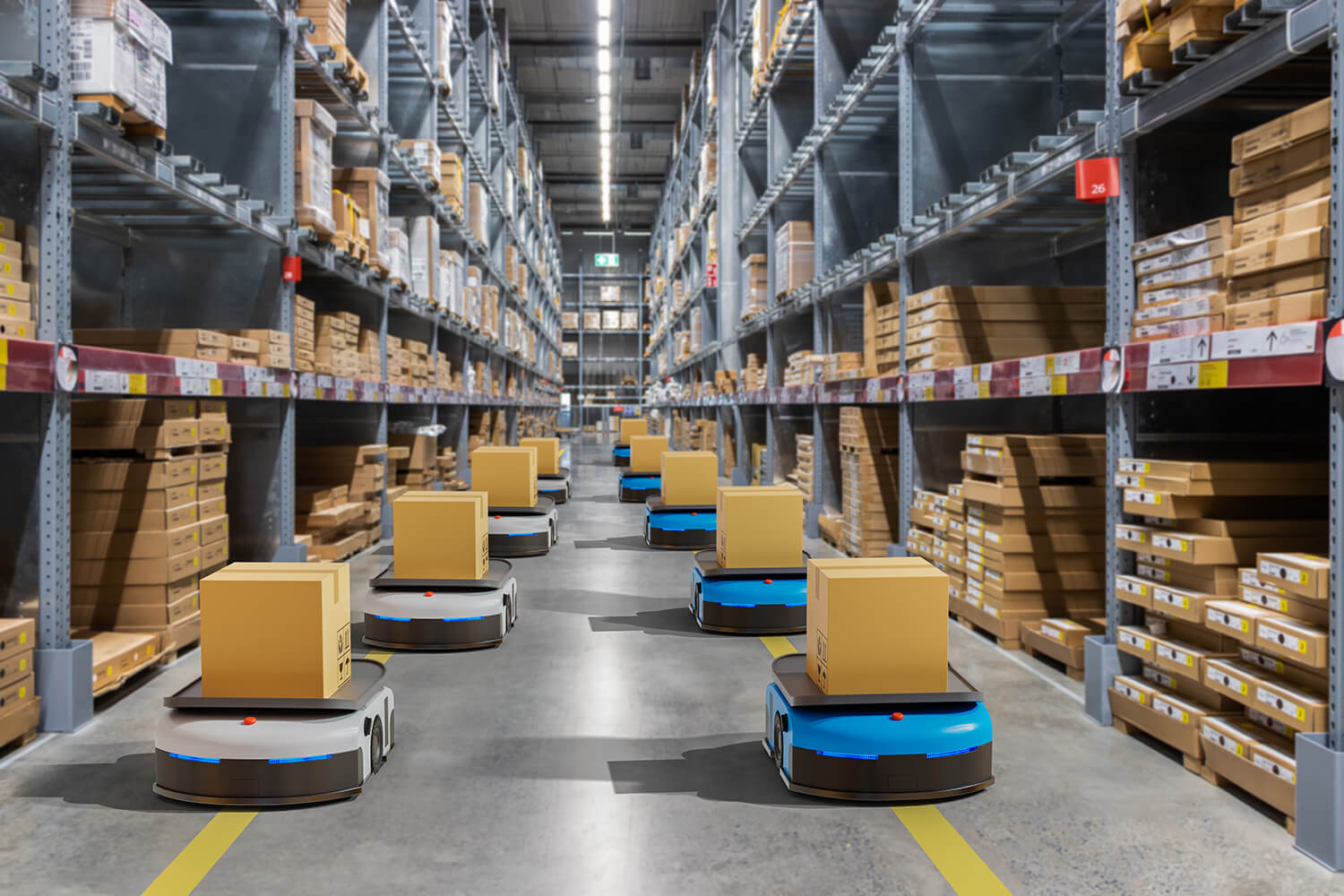If there’s one thing that can take digitalisation leaps and bounds forward, it’s fast, low-latency communication. These two attributes are the hallmarks of 5G networks, the deployment of which will enable a wide range of applications from robot-to-robot communication to virtual reality to the operation of autonomous vehicles. Many companies find it worthwhile to have their own mobile private network.
The map of the Czech Republic with the locations where 5G networks are already running looks more like a cake with raisins baked by a thrifty housewife. Operators were allocated 5G frequencies at the end of 2020. Today, in addition to agglomerations such as Prague, Brno and Ostrava, several dozen other cities are covered by this signal, but most of the country is still waiting for ultra-reliable, low-latency communications. Mobile operators, including virtual ones, promise rapid growth.
For many companies, what’s more important than overall 5G signal coverage is what’s happening right on their premises. They are deploying mobile private 5G networks (MPNs) to create a base for a wide range of applications that would be impossible to implement without a “fast network”.
Mobile Private Network (MPN)
is a dedicated enterprise network that enables the operation of new and near-term mission-critical applications by creating a local wireless network in the workplace. It is reliable, secure, scalable and can transform the way organizations operate.
Faster, on time and on point
5G is the new telecommunications standard for mobile networks, which, as the name suggests, marks the fifth generation of these systems. It will gradually replace the 4G LTE currently in use.
The 5G network should, in theory, be up to ten times faster and have significantly lower latency, i.e. the delay between action and reaction. Let’s leave aside the speed of downloading video games on mobile devices. One area where the benefits of 5G will be more significant, or even a prerequisite, is in the area of communication between devices. This can be both the operation of devices in the home and, in particular, communication between machines and equipment in industrial enterprises.
“To fully develop Industry 4.0, 5G networks are a prerequisite.”
“Simply put, by setting aside a part of the network licensed by a mobile operator purely for the needs of a certain corporate customer, a secure homogeneous environment is created that is available only to him, and he decides who he lets into it,” says Luboš Lukasík, Director of Corporate Customers at T-Mobile, and continues, “5G is not only faster and with very low latency, but it also allows you to connect a much larger number of devices, sensors, sensors. There can be up to several thousand of these per square metre, which brings huge opportunities for businesses.” Another notable advantage of 5G networks is that they can process data and deliver results right in the immediate vicinity of the devices that connect over them.
Wifi is no longer enough
Industry 4.0, by which we mean primarily digitally connected production systems, cannot be fully developed by companies without 5G networks. “The wifi connection used so far is often not reliable and data cables, besides being a hindrance, mean higher latency,” says a representative of a mobile operator, giving an example. Imagine a camera taking a high-resolution picture of, for example, the weld quality of a product. If the images are transmitted by a 4G signal, this will not allow for high-volume comparisons of the acquired image with the sample and essentially real-time evaluation of whether the product is OK or not, so that it can be discarded if necessary.”
T-Mobile is working with Czech universities to test applications that make 5G networks possible. It has been involved in the creation of so-called testbeds at the Czech Technical University in Prague, the Brno University of Technology, the Technical University of Liberec, and the Czech University of Agriculture in Prague’s Suchdol. At the same time, T-Mobile is exploring other possibilities of use for its parent company Deutsche Telecom.
The pace has slowed down
Quality control is just one example. There are many other applications that are becoming real thanks to 5G networks. For example, fast and error-free response from servers is required by virtual reality applications that allow a technician to work on the same operation as his colleague on the other side of the globe. Similarly, autonomous vehicles, including those that operate the manufacturing process and provide logistics, cannot do without 5G networks.
It is clear that 5G networks will take digitalisation leaps and bounds forward. Luboš Lukasík says that while the deployment of 5G networks is moving fast, the response of manufacturing companies to the technological change has been rather slow so far.
“5G networks will be absolutely crucial for Czech companies in the future. Without them, it would be very difficult to fully digitise domestic factories, as we see in the most advanced economies,” Radek Špicar, Vice President for Economic Policy and Export at the Confederation of Industry of the Czech Republic, points out, adding: “We have seen intensive investment in digitisation, automation and robotization among Czech industrial companies during the covid. But then their pace slowed down as companies began to struggle with the energy crisis. Because of it, they started to invest mainly in energy savings and renewable energy sources. Therefore, investments in digitisation and the development of 5G networks need to be restarted so that Czech companies do not miss the train in this important area.”
“Companies’ response to technological change has been slow so far.”
According to him, these investments are all the more important in the Czech Republic because we suffer from a chronic shortage of workers, which can be replaced thanks to automation, and also because of the lower labour productivity that the Czech economy shows compared to the most advanced European economies.
Toyota, ŠKODA, Continental
T-Mobile installed its first MPN last year at Kvados, which plans to use it mainly for autonomous vehicles in warehouses. But it’s not the only one. Last year, several companies announced similar projects, backed by two other operators. While Vodafone is involved with ŠKODA AUTO, for example, O2 has BD Sensors as its first commercial customer for MPN operations. However, at the beginning of 2023 there are at most dozens of similar companies in the Czech Republic.
At the end of last year, MPN was also established at Toyota of Cologne. “The private 5G network will enable us to further optimise our production and logistics processes while meeting our requirements for reliability and security. With T-Mobile, we have come a long way from a feasibility study to our own network, where we can thoroughly test several specific applications and then decide which path to take to use standalone 5G technology within our European production plants,” says Ales Höfner, IT Director at Toyota Motor Manufacturing Czech Republic.
At ŠKODA AUTO, tests are underway on several options for use within the plant. “We are evaluating the effectiveness of the chosen solutions and deciding on the way forward. The private 5G network is a milestone for ŠKODA AUTO on the road to a smart manufacturing plant. This technology offers enormous potential for future innovations, for example in the area of predictive maintenance or optical inspection in body design. The 5G network standard also opens up new possibilities for autonomous transport in logistics, augmented reality in production and many other applications,” says spokesman Martin Ježek on behalf of the Czech carmaker.
Continental Automotive in Brandýs nad Labem also sees the 5G network as a future integral part of the IT infrastructure for production projects within the Digital Factory concept. “We are currently just before ordering and implementing it in a predefined part of production where we want to test the network. Since there are currently no actual projects that have 5G as a prerequisite, we want to build a so-called Proof-of-Concept in the next three years, where future applications connected with the 5G mobile private network will be created and debugged,” explains Jakub Hamerník, who is managing the 5G network project in Brandýs. According to him, this private network will increase the data throughput of IT infrastructure and data availability, enable the connection of additional devices and improve the mobility of equipment on the production floor.

Mobile private 5G network can streamline logistics processes in companies | Illustration photo: Shutterstock.com
Nothing complicated
According to Luboš Lukasík, there is nothing complicated about introducing MPN in a company and it does not represent a big cost for the company. The mobile operator will place the masts and lend the necessary equipment. Then a monthly lump sum, usually in the tens of thousands, is paid for management and maintenance.
When it comes to interconnecting the 5G network with equipment already installed in the company, in most cases this is also not a problem. Often, according to Luboš Lukasík, it is enough to add the right module. “Our staff will familiarise the company’s IT department with what 5G networks can do. It is up to them to find the areas where they will be most beneficial and therefore where they will be used,” he adds.
For the sake of completeness, it should be added that businesses can implement their plans whether or not their operator has already made the network operational in the locality. One of the system operators can also take care of the build-out.
Where 5G networks are being deployed in businesses and what they enable
Autonomous Guided Vehicles (AGVs)
- Reducing costs by replacing driverless trucks with AGVs
- Flexible and optimised interconnection of production processes
- Higher performance, reliability, fewer operational risks
- Ideal for use of AGVs when moving from indoors to outdoors or between halls
- Optimal logistics and warehouse management
Machine recognition and image processing
- Improved quality assurance based on AI-driven optical analysis
- Complete inspection of all manufactured parts
- Faster production thanks to very fast defect detection
- Reduced costs for quality assurance processes
Augmented and virtual reality
- 5G enables longer working hours in augmented and/or virtual reality environments thanks to low latency
- Visualization of data in a real environment and context
- Cost and time savings in staff training
- Remote guidance of maintenance personnel – speeding up the maintenance process and saving travel costs
Data collection from production equipment and sensors
- Predictive maintenance – cost savings by predicting potential failures (a potential failure will not stop production)
- Measurement, prediction and optimization of power consumption
- Optimisation and monitoring of machine utilisation
- Production planning with maximum use of available resources in real time
- Other applications
University 5G network . Data transfer solved
Professor Pavel Václavek’s research team at the Central European Institute of Technology (CEITEC) at Brno University of Technology has extensive activities in the field of Industry 4.0 technologies as well as in the area of electromobility and highly automated vehicles. In both these application domains, the problem of data transfer between different parts of the system arises, where wired connections are often technically difficult. And at the same time, these systems have high demands for low latency (e.g. due to functional safety), reliability and security of data transmission. And it is precisely these features that emerging 5G networks offer. CEITEC launched its own private 5G SA network in November last year in cooperation with T-Mobile.
“In general, a 5G network will allow us to deploy wireless communications where it has not been possible or practical before. In industrial technology, we intend to address the use of 5G for network automation, sensor data collection and control of human-cooperating robotic systems. At the same time, we also have activities in the field of automotive technologies, where we are working on the development of a system for remote teleoperation of vehicles and machines. Another example is the problem of remote diagnostics of drives for future electric vehicles,” explains Pavel Václavek.
The Cybernetics and Robotics team at CEITEC is focused primarily on applied research, so it is clearly aiming for results with real applicability in industry. Virtually all research activities are carried out in cooperation with leading European companies, especially from the automotive industry. “Unfortunately, most of the cooperation is rather with companies from Germany, Austria and France, and the share of Czech companies in the cooperation is not very large in our case,” says Professor Pavel Václavek.
“At CEITEC, the 5G network will also help in the development of a system for remote teleoperation of vehicles and machines.”
Activities that enable the deployment of 5G networks certainly have commercial potential. However, it is premature to estimate them at this point, because the first projects using this technology will have commercially viable results in two to three years, according to Professor Vaclavek.
CEITEC uses various sources to fund research, both grants from subsidy programmes and commercial income from contract research projects funded by industrial partners. Research is dominated by large international projects addressing complex technological problems.
In addition to research, CEITEC is also working on two projects that provide interesting opportunities for small and medium-sized enterprises. “The first is the European digital innovation hub EDIH DIGIMAT, focusing on digitisation, automation and robotization of production processes. The second is a project from the Testing and Experimental Facilities TEF AI-MATTERS challenge addressing the application of artificial intelligence in manufacturing systems. The principle of both of these projects is to provide testing, consulting and support services for the introduction of digitalisation and AI into the production processes of small and medium-sized companies. They can thus gain access to our testing infrastructure (including 5G network) and other services for a truly nominal fee. Most of the costs are financed by the EU and national budgets,” says Professor Pavel Václavek from CEITEC.
Contact
Next articles and interviews
Next articles and interviews
+ Show









